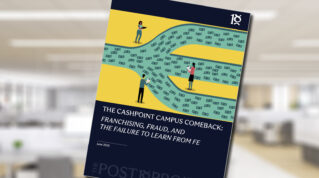Ministers will today finally unveil plans to reform post-18 higher education and lifelong learning funding – three years after the May 2019 Augar Review called for a “more balanced” funding approach between government, students and taxpayers.
The flagship lifelong loan entitlement (LLE), first trailed by the prime minister in a speech at Exeter College in September 2020, will finally be subject to a public consultation.
The consultation, expected today, will outline what the government believes to be a “seismic shift in the way post-18 education is funded and accessed” including a “streamlined” funding system for modular courses at levels 4 to 6.
Through the entitlement, students will have access to loan funding worth up to the equivalent of four years of undergraduate study – £37,000 by today’s fee level.
The new entitlement isn’t earmarked to be available to students until at least 2025. In the meantime providers, including colleges, universities and private ‘alternative providers’, as well as students, are being asked to give their views on how the new system of funding HE level credits and modules should work.
The consultation, announced today as part of the government’s long-awaited response to Philip Augar’s 2019 review of post-18 education funding, will seek views on radically expanding enrolments on higher technical courses at levels 4 and 5.
In particular, the Department for Education has said they are interested in “the barriers faced by providers in offering and promoting level 4 and 5 courses and the role of fee and funding systems in affecting provider and learner behaviour”.
Pre-briefed proposals that are part of the government’s higher education funding reforms include introducing new eligibility criteria for access to student finance support for tuition fees and maintenance loans. These proposals have been met with widespread criticism from FE and HE sector leaders who have argued that arbitrary GCSE and/or A-level entry criteria to access HE student finance could provide an unfair passport to higher education for better off students.
For more traditional university-level HE routes, the government is confirming their plans to freeze the annual tuition fee cap at £9,250 for enrolments up to and including 2024/25.
For new students, the student loan repayment threshold will be reduced from £27,295 to £25,000 from 2023/24 and they will have longer, 40 years, to pay their loans back. In addition, the variable interest rate on student loans will be reduced to RPI +/- 0% for student starting obtaining student loans from 2023/24.
This comes as a key plank of the government’s ambition to reduce the amount of student debt that is ultimately written off by the taxpayer.
Education Secretary Nadhim Zahawi said: “Our country’s world leading universities and colleges are key to levelling up opportunity by opening up access to a range of lifelong flexible post-18 options to help people train, retrain and upskill.
“This package of reforms will ensure students are being offered a range of different pathways, whether that is higher or further education, that lead to opportunities with the best outcomes – and put an end once for all to high interest rates on their student loans.”
A second consultation, also launched today, will seek views on new government controls on the types of courses HE aspiring students have access to. This includes proposals to limit access to student finance to students that have achieved at least grade 4s at GCSE English and maths or at least to Es at A level.
‘Process with caution’
David Robinson, Director, Post 16 and Skills of the Education Policy Institute (EPI) said: “We think that the government should proceed with caution in relation to the proposed reforms to higher education funding and access. Proposals to introduce minimum entry requirements for students must be carefully considered by the government, along with an assessment of the impact on disadvantaged and under-represented groups.
“At present, students who do not achieve a grade 4 in English and Maths at GCSE may have limited options in accessing Level 3 courses, including T Levels. This, in turn, means it is harder for them to secure two Es at A Level (or equivalent). It is therefore important that the government considers whether contextual factors, such as student background or learning loss, should be taken into account when applying for student loans.”
David Hughes, Chief Executive, Association of Colleges said: ”Until now, the HE system has been designed to favour full-time, mainly young bachelor degree students. A key test of these proposals therefore is how far they enhance opportunities for adults and support college HE to grow whilst protecting what universities do so well.
“This consultation has been a very long time coming and implementation is some time off. We would like to see the promise of the lifelong learning entitlement to be delivered as soon as possible. Government needs to stop talking about a lifelong learning entitlement and get on and deliver it.”

















Your thoughts